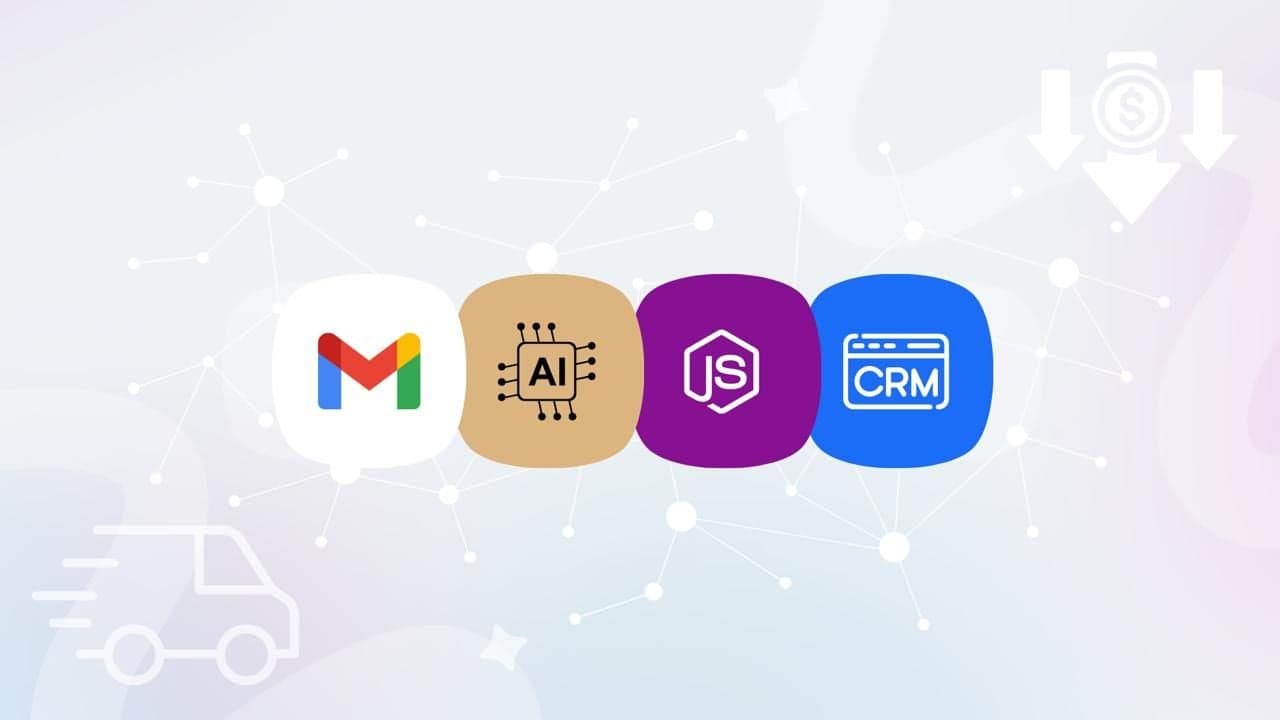6 Simple Airline Processes You Can Automate With No Code
Automate airline operations with no-code tools to enhance efficiency, reduce costs, and improve passenger satisfaction across key processes.

Airlines can save time, cut costs, and improve customer satisfaction by automating key processes with no-code tools like Latenode. From ticketing to compliance reporting, automation reduces manual work and ensures smoother operations. Here are six processes you can automate today:
- Ticketing and Reservations: Automate booking confirmations, payment processing, and CRM updates to reduce errors and improve customer experience.
- Check-In and Boarding: Send automated reminders, assign seats, and deliver boarding passes to streamline passenger flow.
- Customer Support: Use AI to handle routine inquiries, escalate complex issues, and keep passengers informed about delays or changes.
- Baggage Handling: Integrate RFID tracking to monitor luggage in real time and notify passengers of their bag's status.
- Crew Management: Automate crew scheduling, duty compliance checks, and training updates to avoid disruptions.
- Reporting and Compliance: Generate accurate reports, monitor regulations, and ensure data consistency without manual input.
Why Latenode? Its no-code platform connects over 300 apps, enabling airlines to design workflows quickly and securely without coding expertise. Start automating today to boost efficiency and enhance passenger satisfaction.
How To Make Apps With No-Code Like A Pro? Learn To Use App Builders & Latenode Low-Code Automation!
6 Airline Processes You Can Automate with No Code
Airlines manage an immense volume of transactions every day, creating countless opportunities to improve efficiency and passenger satisfaction through automation. Each interaction presents a chance to simplify operations while enhancing the travel experience. With Latenode's visual workflow builder and over 300 app integrations, airlines can automate essential processes without needing any coding expertise. By leveraging automation, airlines can achieve smoother operations and deliver exceptional service.
1. Ticketing and Reservations
The booking process is often the first impression passengers have of an airline, yet many systems remain outdated and overly complex. Research indicates that 53% of customers abandon online transactions if they face delays in assistance, and 50% would switch to a competitor after a single poor booking experience [2].
Latenode bridges the gaps between booking engines, payment systems, customer databases, and communication tools. It can instantly send booking confirmations, update inventory, and create CRM profiles. For international travelers, the platform detects their location and sends messages in their preferred language - important, as 75% of consumers prefer to shop in their native language [2]. Payment processes are also simplified, with Latenode handling credit card validation and fraud detection to ensure secure, PCI-compliant transactions.
2. Check-In and Boarding
Passengers expect seamless check-in and boarding experiences, and airlines that meet these expectations foster loyalty. Studies show that 90% of people who experience effortless service are likely to return, compared to only 4% who face difficulties [3].
Using Latenode, airlines can set up automated workflows to begin check-in reminders 24 hours before departure. Notifications are sent via email, SMS, or app alerts, depending on passenger preferences. Once check-in is complete, the system assigns seats based on loyalty status, special needs, or aircraft layout, and delivers boarding passes through the passenger’s chosen channel. Robust security measures also help prevent unauthorized check-ins and overbooking issues.
3. Customer Support
Modern customer support goes beyond basic chatbots, using advanced AI to address complex issues while maintaining a personal touch. A 2022 study by Amelia found that AI-powered voice agents helped a major airline increase customer satisfaction by 20% and reduce call handling times by 35% [2].
Latenode enables airlines to build multi-channel support workflows that sort inquiries by urgency and complexity. Routine questions, such as flight updates or baggage policies, are handled by AI chatbots connected to the airline’s knowledge base. More complicated issues, like refunds or special requests, are escalated to human agents with full passenger details at their fingertips. The platform also monitors flight data, weather, and operational disruptions, proactively notifying passengers of delays or alternative options. Integration with CRM systems ensures all interactions are recorded, reducing repetitive conversations and enabling personalized support.
4. Baggage Handling and Tracking
Baggage mishandling remains a major frustration for travelers, with 6.9 bags mishandled per 1,000 passengers and $2.4 billion in losses reported in 2018 [4][5]. However, airlines using automated tracking systems have seen significant improvements. For example, Delta Air Lines implemented RFID tracking across all 344 global stations, handling over 100 million bags annually. By 2023, their mishandling rate dropped to just 0.34%, making them one of the top U.S. airlines for baggage handling [6].
"Innovation isn't about finding ways to use the latest gadget or shiny object, it's about working with our operational teams to find scalable solutions that solve actual issues in our operation for maximum customer and employee benefit – even if the technology we use, like RFID, has been around for a while." - Gil West, Delta's Chief Operating Officer [5]
With Latenode, airlines can integrate RFID systems, airport databases, and communication tools to automate baggage tracking. At every checkpoint, bag scans update tracking records and notify passengers of their luggage status. The system also analyzes historical data and current conditions to predict potential mishandling issues, alerting ground crews to take corrective action.
5. Crew Management and Scheduling
Managing airline crews involves balancing regulatory compliance, union agreements, and operational disruptions. Latenode simplifies crew scheduling by linking scheduling systems with regulatory databases, training records, and communication platforms. The system automatically assigns crew members based on certifications, duty limits, and rest requirements. When schedules change, affected crew members receive instant notifications with updated details.
Automation reduces manual workload and ensures compliance with FAA regulations and company policies. For instance, if a scheduling conflict risks exceeding maximum duty hours, Latenode flags the issue and suggests alternatives. The platform also tracks training and certifications, scheduling updates before they expire to avoid disruptions.
6. Reporting and Compliance
Accurate reporting is critical in aviation, where regulatory oversight demands detailed data on performance, safety, and other metrics. Generating these reports manually is time-intensive and prone to errors, which can lead to penalties. Airlines must meet various standards, including IATA Resolution 753 for baggage tracking and DOT requirements for passenger rights.
Latenode automates compliance reporting by continuously gathering data from operational systems. It generates reports on schedule, tracking key metrics like on-time performance, baggage handling, and customer complaint resolution. The system also monitors regulatory changes, updates templates accordingly, and alerts compliance teams to anomalies. Real-time dashboards provide executives with operational and financial insights, ensuring informed decision-making.
Benefits of Automating Airline Processes with Latenode
Automation in the airline industry leads to measurable cost savings and enhanced customer satisfaction. With Latenode's no-code platform, these improvements are easily implemented through its visual workflow builder and ability to integrate with over 300 apps, streamlining processes across the board.
Better Operational Efficiency
Automation helps airlines reduce the manual tasks that slow down operations. For example, automating financial processes can lower operational expenses by up to 90% [7], freeing up resources for more strategic priorities.
A notable example is Japan Airlines, which introduced the JAL-AI Report, an AI-powered mobile app that simplified post-flight documentation. Previously, flight attendants spent up to 60 minutes per flight recording onboard incidents. This tool cut that time to just 20 minutes, a reduction of 67% [9].
Similarly, American Airlines implemented AI-driven gating technology at Dallas/Fort Worth International Airport. This system analyzes real-time flight data, air traffic, and airport logistics to assign gates dynamically. The result? Taxi times were reduced by over a minute per flight [9], leading to fuel savings and better on-time performance.
Latenode enables comparable improvements by integrating systems like crew scheduling software with weather data and flight operations. For instance, it can automatically adjust crew assignments based on changing conditions, eliminating manual coordination and ensuring compliance with aviation regulations.
Better Passenger Experience
Operational efficiency directly translates into a smoother travel experience for passengers, fostering loyalty and satisfaction. Streamlined processes through automation have been linked to a 37% increase in repeat customers [7], demonstrating the strong connection between efficient operations and passenger retention.
Self-service check-in kiosks, for instance, cut check-in times by 50% [8], allowing passengers to navigate airports more quickly. At Singapore Changi Airport, an AI-driven baggage handling system reduced the average transfer time from aircraft to baggage carousel by 25%, achieving a 98% passenger satisfaction rate [8].
Customer service automation also plays a significant role. By 2025, chatbots are expected to handle 95% of customer interactions [7], managing routine inquiries instantly while escalating complex issues to human agents. Schiphol Airport has adopted an AI-based Passenger Experience Platform to provide personalized recommendations, send timely flight updates, and guide passengers through the airport via messaging apps [8].
With Latenode, airlines can create workflows that prioritize passengers at every stage of their journey. For example, an automated process might monitor flight schedules, send proactive delay notifications, rebook connecting flights, and arrange ground transportation - all while keeping passengers informed through their preferred communication channels.
Compliance and Data Accuracy
Beyond operational improvements, automation ensures compliance and accuracy in data management - critical elements in the aviation industry. Meeting regulatory standards requires precision, something manual processes often struggle to deliver. Automation ensures consistent data handling, reducing errors and maintaining compliance [7].
Data quality is a significant challenge for airlines, as their information spans multiple systems, time zones, and regulatory frameworks. According to Dr. Satya Ramaswamy, Chief Digital and Technology Officer at Air India:
"Interpreting these data insights requires rare skills, not easily understood by everyone. You need the help of very powerful technology that can dig into multiple layers of data and then unearth the gems that we can act upon to improve operational performance and customer service. AI helps airlines make sense of the massive amount of data coming our way." [9]
Latenode addresses these complexities by ensuring seamless data flow between interconnected systems. Automated workflows replace error-prone manual entries, maintaining clean and structured data for decision-making and compliance reporting.
Additionally, real-time monitoring becomes possible when systems are connected. For example, in the first half of 2024, 1.67% of flights were canceled [7]. By integrating maintenance systems, flight operations, and passenger communications, Latenode workflows can detect potential issues early, coordinating swift responses to minimize disruptions.
The platform also supports automated analytics tools that monitor large volumes of operational data, flagging potential regulatory concerns before they escalate [10]. This proactive approach helps airlines avoid penalties while maintaining high safety and operational standards.
sbb-itb-23997f1
Security Considerations for Airline Automation
Latenode’s automated workflows are built to prioritize security, addressing both data protection and system reliability. With the aviation cybersecurity market projected to reach $6.46 billion by 2027 [11], safeguarding sensitive information and ensuring operational stability is more critical than ever. Airlines, which manage vast amounts of passenger data and financial transactions daily, must adopt robust security practices when leveraging platforms like Latenode.
Protecting Passenger Data
Airlines handle highly sensitive information, such as passport details and payment data, making data protection a top priority. The EasyJet data breach of 2019–2020, which exposed the personal information of nearly nine million customers, highlights the risks of inadequate cybersecurity measures. Incidents like this emphasize the necessity of thorough security protocols and frequent system evaluations.
To secure passenger data when using automated workflows with Latenode, encryption is essential. Encrypting data both in transit and at rest ensures that sensitive information remains protected throughout the process. For airlines with specific data residency requirements, on-premises hosting can offer an additional layer of control.
Multi-factor authentication (MFA) is another critical security measure, limiting access to authorized personnel. Latenode’s integration capabilities allow seamless connection with enterprise identity management systems, ensuring that only approved users can access key workflows. Additionally, implementing the principle of least privilege - granting users access strictly based on their roles - further minimizes exposure to potential threats.
Regulatory compliance is equally important. Adhering to standards such as GDPR, ISO 27001, and PCI DSS ensures that data handling practices meet international benchmarks. Latenode simplifies compliance with built-in certifications and audit trails, enabling airlines to automate processes while maintaining regulatory alignment. These protective measures create a solid foundation for ensuring system reliability, which is explored next.
Ensuring System Reliability
In aviation, even brief system downtimes can result in significant financial losses. For instance, one hour of operational disruption at a major airport during peak times can cost up to $1 million [12]. The 2024 CrowdStrike incident, which caused Delta Air Lines to cancel over 1,200 flights and disrupted nearly 2,700 flights across the industry, underscores how vital system reliability is to airline operations [12].
Continuous system monitoring plays a key role in preventing disruptions. Latenode’s execution history and monitoring tools allow airlines to track workflow performance in real time, quickly identifying and addressing bottlenecks or anomalies before they escalate.
Latenode also supports Zero Trust security principles, which require verification for every user and device. Granular access controls and secure API connections ensure that only authenticated entities can interact with the system.
To maintain reliability, regular security audits and vulnerability assessments are indispensable. These evaluations help uncover potential weaknesses before they can be exploited. For example, the Sage Copilot AI incident in January 2025 demonstrated how improper data handling and lax access controls could expose sensitive business information. Rigorous testing and validation are essential when deploying AI-powered automation workflows to avoid similar pitfalls.
Finally, having a well-documented incident response plan enables airlines to act swiftly in the event of security breaches or system failures. Latenode supports automated incident response by integrating monitoring systems with communication tools and escalation protocols, significantly reducing response times during critical situations. This proactive approach ensures that airlines can maintain operational stability even when challenges arise.
Choosing the Right Automation Tools to Integrate with Latenode
Selecting the right automation tools is essential for creating secure, efficient, and compliant workflows with Latenode. The tools you choose should align with your operational needs while delivering reliability, cost-effectiveness, and strong integration capabilities.
Key Factors to Consider
- Data Residency: For sensitive information like passenger details or financial records, opt for tools that provide on-premises options, ensuring you maintain full control over where your data is stored.
- Security: Prioritize tools with advanced security features such as data encryption, multi-factor authentication, and a proven history of safeguarding user data.
- Compliance: Check that the tools meet regulatory standards like GDPR or SOC-2. Features like compliance reporting and audit trails can simplify adherence to these requirements.
- Reliability and Backup: Consistent uptime and robust disaster recovery options are non-negotiable. Ensure the tool includes clear escalation procedures for resolving system issues.
- Integration Capabilities: Choose tools with native APIs and support for standard data formats to ensure seamless connectivity with your existing systems.
- Cost Considerations: Evaluate pricing models to ensure they align with your budget without compromising on essential features.
- Customer Support: Strong customer support is invaluable. Assess response times, technical expertise, and escalation processes to ensure swift issue resolution during critical operations.
By keeping these criteria in mind, you can build a foundation for secure and effective integrations with Latenode.
Enhancing Integrations with Latenode
Latenode’s integration features make it a powerful platform for streamlining complex workflows. Its visual workflow builder simplifies the process of connecting airline systems and third-party tools, even for non-technical users. For advanced needs, the platform supports custom JavaScript code and NPM modules, enabling tailored solutions for unique operational challenges.
Additionally, Latenode’s GPT-4 AI Co-Pilot offers intelligent support, helping teams quickly resolve integration issues and improve workflow efficiency. The HTTP-request module ensures universal connectivity, making it easy to integrate specialized systems like crew scheduling or baggage tracking tools.
In practice, Latenode can help automate tasks such as enriching customer support data by pulling information from multiple systems or synchronizing workflows across platforms. This flexibility empowers teams to manage complex integrations without needing specialized technical expertise for every adjustment. The result is a streamlined, efficient operation that adapts to evolving business needs.
Conclusion: Boost Efficiency and Growth with No-Code Automation
The airline industry stands at a turning point where no-code automation offers a clear path to enhancing operational efficiency, improving passenger experiences, and meeting regulatory demands. By implementing no-code solutions, airlines can quickly roll out projects and significantly reduce service costs [1].
Latenode plays a central role in this transformation by integrating over 300 apps with AI-driven features, enabling airlines to design automation strategies that cover the entire journey - from booking to post-flight reporting. Real-world applications underscore these benefits. As Sophia E., an Automation Specialist, shares:
"Latenode is a cost-effective and robust alternative to the usual AI automation tools. It's easy to use, even for beginners, thanks to its simple and intuitive interface" [13].
Latenode's pricing model, based on processing time [14], provides scalability without the concern of rising costs as workflows grow more complex. This approach empowers airlines to expand their automation efforts affordably and efficiently.
For those seeking technical simplicity, Latenode's AI-assisted development removes traditional hurdles. Francisco de Paula S., a Web Developer in Market Research, highlights this feature:
"The AI javascript code generator node is a life saver, if you get to a point in the automation the a tool or node is not yet created to interact with Latenode" [13].
Additionally, access to over 400 AI models under a single subscription simplifies integrations and enhances functionality [13].
Examples from real-world use further illustrate Latenode's effectiveness. In September 2024, Hoang T. from Education Management praised the platform's responsive support team for assisting with form submission workflows. Similarly, in December 2024, Islam B., CEO of Computer Software, noted:
"AI Nodes can be used without API keys, using Latenode credit to call the AI models, making it super easy to use" [13].
Airlines gain from fewer manual errors, faster response times, improved data accuracy, and stronger compliance measures. The platform's advanced security features and rapid deployment capabilities make it especially well-suited for the stringent requirements of the airline industry.
These advancements open the door for airlines to strategically expand their automation efforts. Starting with high-impact, low-complexity tasks and gradually scaling up, airlines can leverage Latenode's intuitive visual workflow builder and AI tools to create automation systems that evolve alongside their operational and regulatory demands.
FAQs
How can no-code tools like Latenode help airlines streamline their operations?
No-code platforms, such as Latenode, are transforming the way airlines manage their operations by automating routine tasks, connecting different systems, and enabling quicker deployment of solutions. With these tools, airlines can streamline processes like ticketing, baggage handling, customer support, and compliance reporting - all without needing advanced coding skills.
By minimizing dependence on IT teams, no-code platforms give non-technical staff the ability to design and adjust workflows independently. This flexibility encourages innovation and faster adaptability, resulting in greater efficiency, reduced operational costs, and an enhanced passenger experience - all while upholding strict security and compliance requirements.
How does Latenode ensure passenger data stays secure in automated workflows?
Latenode ensures passenger data remains secure by implementing a range of protective measures. One key approach is the use of data encryption, which safeguards sensitive information during both transmission and storage, effectively blocking unauthorized access. Furthermore, the platform adheres to critical regulations such as the GDPR and ICAO standards, meaning its data handling practices align with stringent privacy and security protocols.
The platform also integrates digital identity technologies, empowering passengers to take control of their personal data. This includes the ability to give informed consent and share only the specific details required. Together, these strategies create a safe and compliant framework for managing passenger data within automated workflows.
How does Latenode integrate with airline systems to automate processes smoothly?
Latenode streamlines the process of integrating with airline systems by combining robust API functionalities with an easy-to-use drag-and-drop interface. This makes it possible for airlines to connect essential tools like booking engines, CRM platforms, and customer communication systems without requiring extensive programming expertise.
With Latenode, airlines can automate workflows and enable smooth data exchange across critical operations such as ticketing, check-in, customer service, and baggage handling. Its secure infrastructure ensures data protection and adheres to industry regulations, allowing airlines to automate confidently while upholding stringent standards for security and reliability.
Related posts



